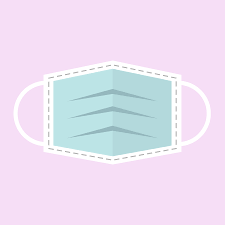Answering Common Mask Questions

November 1, 2020
Throughout the course of the coronavirus pandemic, a lot has changed in the world. One of the most significant changes is mask wearing. In the United States, masks have gone from extremely uncommon to the public norm in just a matter of months. With such a new development, there comes plenty of questions. Luckily for everyone, many of these questions have simple answers.
Do masks make a difference in the spread of COVID-19?
In order to understand the efficacy of mask wearing, it is helpful to look at specific cases where masks were used to prevent disease spread. For example, two hairstylists in Missouri tested positive for coronavirus earlier this year. Each stylist went to work for about 4 days after they had begun experiencing respiratory symptoms. The stylists and their clients each wore face masks the entire time that they were in contact. 67 of these clients were tested for COVID-19, and none of them tested positive (CDC). This example shows how face masks can make a huge difference in stopping the spread of the virus. If the hair stylists had not been wearing masks, it is almost certain that some of their clients would have contracted coronavirus. All of the clients remained healthy after being in contact with someone with COVID-19, which is much different from what would have happened without face masks. Therefore, the positive impact of masks is irrefutable.
How do they work?
Disposable surgical masks and cloth masks both filter the air that a person exhales. The masks block large respiratory particles, such as saliva, which are released as someone breathes or talks. These particles are what carry disease (Mayo Clinic). Simply put, masks allow people to breathe air in, but they stop people from breathing particles of COVID-19 onto other people.
Didn’t the CDC say to not wear masks earlier this year?
It is true that the CDC did not recommend masks in the initial stages of COVID-19 research. However, both the CDC and the WHO have since revoked this claim. Now, masks are highly recommended in all public settings (University of California San Francisco). COVID-19 is a brand new disease to human beings, so it is only understandable that professional knowledge of the virus evolves over time. For this reason, it is important that everyone keeps their own knowledge up to date. This way, everyone will always know the most successful ways to keep themselves and others safe.
Are all face coverings effective?
Some more than others. Experts typically recommend that masks have at least two protective layers of fabric. Gaiters and masks with vents do not follow this criteria, so they are not very effective at blocking particles of COVID-19. Plastic face shields are also not recommended – as there is very little proof of their efficacy (CDC). These are all important things to consider when picking out a mask. In addition, the way someone puts on their mask makes a huge difference. Any face mask should always be worn over the nose and mouth, and there should not be gaps between the mask and the side of someone’s face
How can someone make wearing masks more comfortable?
One main downside to wearing masks is that they can often be uncomfortable. However, there are some easy strategies for making wearing a mask more tolerable. For example, avoid masks made of non-breathable materials, such as vinyl. Making sure that the mask is dry will also keep the mask breathable. For people who wear glasses, finding masks that can be pinched on the nose will prevent fogging (CDC). For almost every discomfort, there is a solution. It is important to find and apply these solutions – instead of foregoing masks altogether.
All Information Gathered From:
https://www.cdc.gov/media/releases/2020/p0714-americans-to-wear-masks.html
https://www.ucsf.edu/news/2020/06/417906/still-confused-about-masks-heres-science-behind-how-face-masks-prevent
https://www.mayoclinic.org/diseases-conditions/coronavirus/in-depth/coronavirus-mask/art-20485449

